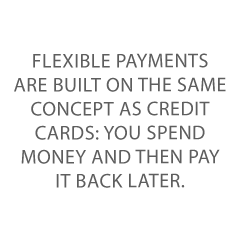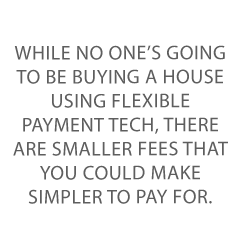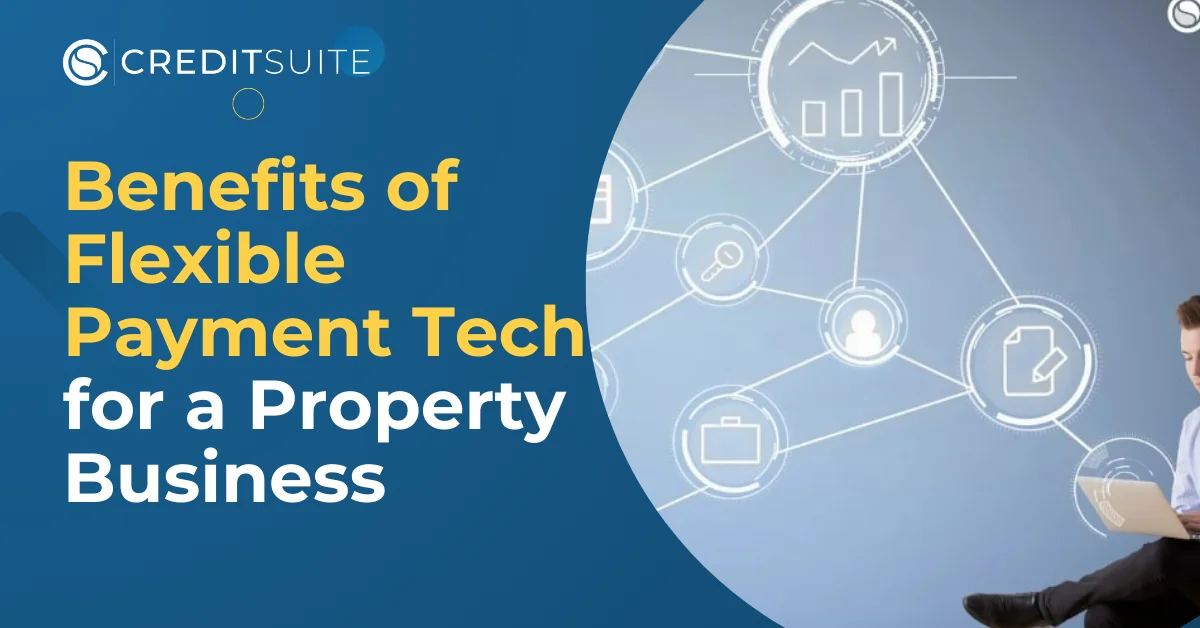Currently, around 30% of Americans don’t have a single credit card; but this doesn’t necessarily mean that spreading the cost has become an out-of-date option. Where cards are starting to fall behind, flexible payment technology is rising.
Becoming a must-have across industries, from clothing companies to grocery shops, this is the digital response to traditional loans that are gaining increasing attention from companies around the world.
Making both large and small purchases easier for their customers, it’s not hard to see why businesses are jumping on the bandwagon!
House flippers, if you take it to the next level, you may end up starting a property company. But, is there a place for this emerging tech in a property company? Let’s take a look.
What Are Flexible Payments?
 Flexible payments are built on the same concept as credit cards: you spend money and then pay it back later.
Flexible payments are built on the same concept as credit cards: you spend money and then pay it back later.
The difference is that with the former option, the entire transaction is usually done online, and is less permanent than with a credit card.
You don’t have to open a bank account, and the ‘credit’ can be a one-time thing with no future ties to the lender.
Flexible payments work by allowing customers to buy a product on a website using a third-party lender.
At this point, a payment plan will usually be created that sets up direct debit installments, ensuring the customer pays the loan back within a certain time period – plus a little added interest.
Flexible payments are an easier way to spread the cost of purchases without the long-term commitment of a credit card.
Examples of Flexible Payment Technology
Flexible payment technology comes in a wide variety of formats.
At CreditSuite, for example, we offer assistance with getting flexible business funding and loans. Rather than applying for a loan via a traditional bank, we’ll first help you get everything organized to ensure you’re eligible for credit.
Then, we’ll look through our thousands of contacts in the lending industry to find a suitable match. It’s an easier, simpler solution to finding money for your purchases.
There are also flexible payment options designed for consumers. PayPal, for example, works with different brands to offer installment options for purchases.
If you buy a couch, let’s say, you could split the total cost over three equal monthly payments.
Bridging loans are another flexible payment technology that both businesses and consumers can take advantage of. These offer short-term loans – again, not via the traditional bank route – that allow you to buy now and pay later.
The Benefits of Flexible Payment Tech For Property Businesses
Whether using them to make business purchases of your own or offering them as options for your customers, as a property business you can take advantage of flexible payment systems.
Let’s take a look at how they could make company purchases and cash flow a little easier.
Grow Your Company Without the Capital
If you’re a startup or a small property business, you might not have a wealth of savings to lean on. Traditionally, you’d follow funding routes such as finding angel investors or applying for business grants.
While these certainly still have a place in the world of business financing, they’re no longer the only options.
Flexible payments open up a new route to growing your business without readily available capital. You can still pay for a website or outfit your new office, but pay the costs back over several months – or even years.
There’s less pressure and more freedom.
If you’re clever and choose to spread the cost of products/services that you’re almost certain will see a good return, the payment plan could end up paying for itself, too.
Of course, there’s risk attached, but some expert advice can help mitigate that.
Find Funding Quickly
Flexible payment technology gives you methods to buy now and pay later far more quicker than traditional alternatives. A bank loan, for example, can take days, weeks, or even months to be approved.
Flexible payment plans can be automatically approved in hours (a couple of days at the most) giving you the funding you need to boost your business now.
Don’t Spend Hours Going Through Paperwork
Bank loans require reams of information to approve loans.
Flexible payment companies are more lenient, relying on basic information such as your credit score, bankruptcy history, and recent bank statements to approve a payment plan.
This is ideal for startups with less history and for companies that don’t want to spend hours finding all the information needed for a traditional loan.
The Benefits of Flexible Payment Tech For Property Customers
As the owner of a property business, could it be wise to set up flexible payment technology for your customers? Let’s take a look at the benefits.
Make Small Payments Easier
While no one’s going to be buying a house using flexible payment tech, there are smaller fees that you could make simpler to pay for. 
These include charges for property listings on your website, consultation fees, and third-party property services you offer, like cleaning or removals.
Setting up online flexible payments provides an alternative way for customers to spread the cost of these services, giving them the payment options they’re looking for.
Reach a Wider Audience
Not everybody has the money to pay for fees upfront. Does that mean they should lose out on premium property services?
From paying for open houses to covering the costs of marketing, flexible payment technology makes your services more affordable to a wider audience. In terms of boosting your client base, that’s a no-brainer.
Step into the Future
Flexible payment options are becoming more than just a happy bonus for customers.
Among the younger generations, in particular, digital payment plans are replacing credit cards, with millennials almost twice as likely not to own a credit card compared to older generations.
This isn’t because they don’t want to spread the cost of their purchases. The concept of credit is still appealing, but younger consumers are put off by the hoops they have to jump through with banks.
Many struggle to get accepted for a card. Recessions and debt crises have also made them wary of traditional credit routes.
Flexible payments, though, don’t carry the same weight, with no long-term account appealing to skeptical consumers and helping your business to stay ahead of the times.
Final Words
Flexible payment tech is a smart solution for modern businesses and can help your property company reach a wider, younger audience.
We live in a digital world now, and if you’re not keeping up with the latest software then you’re more likely to fall behind.
Hopefully, this article has given you some insight into why you might want to implement your own flexible payment technology, ensuring your brand moves with the times.
Contact us today for more information on how setting up your small business for Fundability™ is just as important as switching to flexible payment tech – and just as good for your bottom line.


